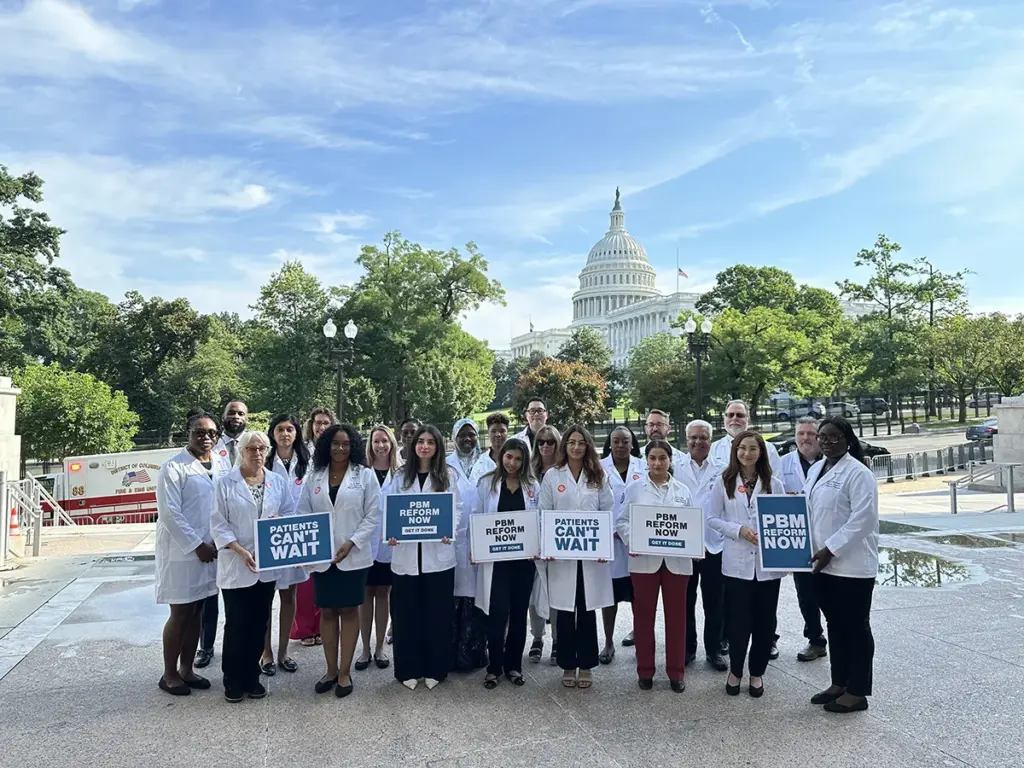
Pharmacists prepare to witness first-hand the July 23 House Oversight and Accountability Committee hearing on PBM practices.
The National Association of Chain Drug Stores (NACDS) today hailed the U.S. House of Representatives Oversight and Accountability Committee for its ongoing bipartisan investigation of pharmacy benefit manager (PBM) tactics, and for keeping up the momentum for what the Association calls “must-pass” PBM reforms in the 118th Congress.
NACDS President and CEO Steven C. Anderson submitted a statement for the record of a hearing at which the top executives of the three largest PBMs testified.
Anderson wrote: “NACDS applauds the Committee’s bipartisan efforts to investigate the role of market-dominant PBMs in escalating Americans’ prescription drug costs; in diminishing Americans’ access to the medications prescribed by their doctors; in blocking Americans’ access to their convenient and trusted pharmacies; and in forcing pharmacies out of business. The Committee is taking another important step in its ongoing investigation to hold these PBMs accountable and to demonstrate further the need for meaningful reforms. The Committee’s work is crucial for all Americans and for communities, employers, taxpayers, and pharmacies of all sizes.”
The NACDS statement – as well as a separate statement issued by eight pharmacy organizations including NACDS – described specific PBM reforms for Medicare, Medicaid, and the commercial markets that have advanced in the Congress. Anderson said, “the reforms that now enjoy bipartisan and bicameral consensus must be considered ‘must-pass’ legislation in the 118th Congress.”
The NACDS statement noted that the House Committee’s investigation and that its hearing today occurs alongside ever-increasing evidence of the need for action – with notable recent examples, among many others, including New York Times reporting, a landmark study conducted in Washington State, a Federal Trade Commission (FTC) study, and dedicated efforts of pharmacies to detail their first-hand perspective of pharmaceutical benefit manipulation at the hands of market-dominant PBMs.
NACDS also cautioned that the Committee is likely to hear statements and responses to questions in which the PBMs “cling to long-ago-debunked talking points.” Further, NACDS cautioned against PBM stonewalling and inaction that have been encountered by government agencies – including the FTC in its study of PBM tactics, but also the Centers for Medicare & Medicaid Services in its urging that plans and PBMs “engage in sustainable and fair practices with all pharmacies – not just pharmacies owned by PBMs.”
Noting that Congress, on a bipartisan basis, is increasingly frustrated with the PBMs’ response to government inquiries and efforts for reform, Anderson referenced a January 2024 letter to the FTC from U.S. Senator Chuck Grassley (R-IA) and U.S. Senator Maria Cantwell (D-WA) that took issue with the PBMs’ lack of cooperation with that agency’s study.
Anderson told the Committee: “The pharmacy community is appreciative of the Committee’s investigation and urges tenacity in waging it. With determination, investigations like this one have the potential to help overcome barriers to learning more about PBM tactics, and barriers to confronting them.”
Effectively summarizing what is at stake in the Committee’s investigation and in the Congress’ consideration of legislation in the 118th Congress, Anderson stated: “Every day that is allowed to pass without comprehensive PBM reform is another day that market-dominant PBMs are allowed to sustain and worsen their tactics.
More information about NACDS’ perspective on PBM reform can be found at the Association’s “Access Agenda” microsite. The site includes information about the latest NACDS TV ad – “Time Is Now.”
Photos will be added to this Flickr album throughout the day.